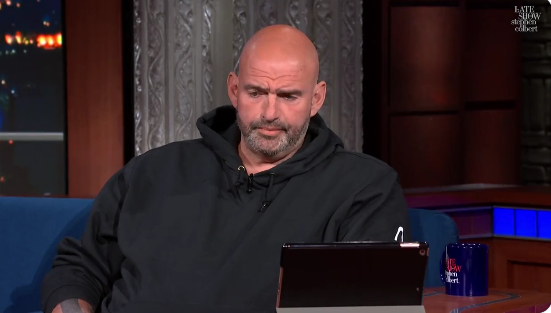Pennsylvania Sen. John Fetterman (D) opened up about his struggle with depression, encouraging people to “please get help.”
During an interview on CBS’ “The Late Show With Stephen Colbert” Colbert told Fetterman that he was the first to “publicly seek help” for his depression, with Fetterman labeling it a “privilege and a duty.”
Colbert pointed out how “a lot of politicians over the years have dealt with depression in different forms,” noting how “Lincoln had his melancholy, Churchill famously had his black dogs,” and “Thomas Eagleton in 1972, got kicked off the Democratic ticket for being treated for depression.”
“But, you’re the first one to publicly seek help for your depression and then lean into educating other people about it,” Colbert told Fetterman, asking what it was like “to discuss” his struggles publicly.
Other politicians who have dealt with mental health issues include the nephew of John F. Kennedy, former Massachusetts Rep. Patrick Kennedy (D) was reportedly the first to open up about his struggles with substance usage and bipolar disorder. Minnesota Sen. Tina Smith (D) battled depression and after Fetterman sought help, she praised his decision, according to The Hill.
Former Florida Gov. Lawton Chiles (D) has also opened up about taking Prozac to help treat his mood swings and depression and has also encouraged people to seek help, according to the outlet.
“It’s a privilege and it’s a duty to talk about this,” Fetterman told Colbert. “Because I want everybody, you know you have an enormous platform, I want anyone who is listening to this or sees this. If you are suffering from depression, please get help. Please get help because it works.”
“If you are suffering from depression, please get help. Please get help because it works," says Senator @JohnFetterman who's become a huge proponent of professional mental health support following his own personal experience.#Colbert pic.twitter.com/dnLZDemoMj
— The Late Show (@colbertlateshow) October 12, 2023
Fetterman described to Colbert how when you have depression, “you are in the blackness” and depression ends up tricking “you into thinking that you’ve lost, even though you might’ve won.”
“I was a skeptic,” Fetterman added. “I’m like, ‘I’m never going to get better, like this is never going to change.’ And, it takes you in a very more dangerous kind of direction and I really want to emphasize, anyone that is on that slope, don’t ever, ever, ever, make the decision to ever harm yourself.”
The former Lt. Gov. of Pennsylvania, and now a first-term senator, Fetterman has previously opened up about his struggle with depression after being discharged from Walter Reed National Military Medical Center where he had been treated for clinical depression since February.
In April, Fetterman spoke with CBS News about how when you have depression, “you may have won, but depression can absolutely convince you that you actually lost.”
More than 8%, roughly 21 million adults in the United States are affected by major depression each year, according to Mental Health America. Roughly 15%, 3.7 million children between the ages of 12 and 17 years old are also affected by depression.

























